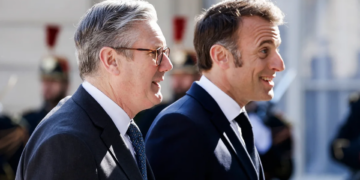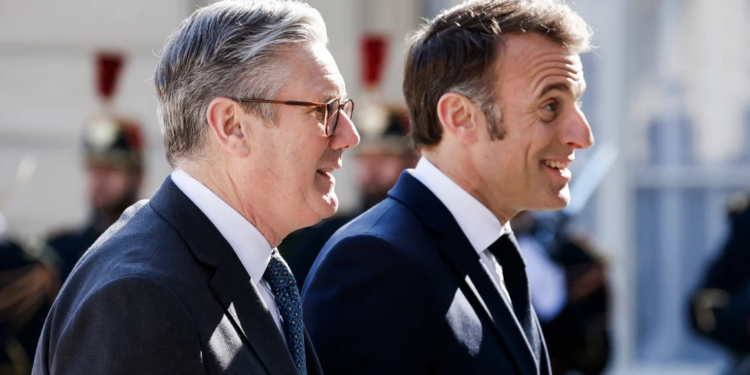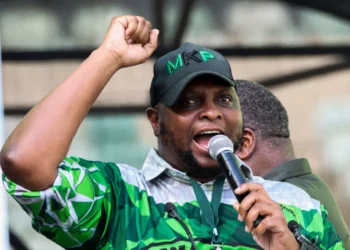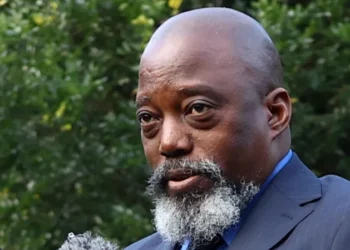As Washington edges closer to a potential Black Sea peace deal, Europe’s major players have drawn a hard line: no sanctions relief for Moscow.
The unified stance from London, Paris, and Berlin serves as both reassurance to Kyiv and a subtle challenge to the Trump administration’s warming ties with the Kremlin.
Thursday’s high-level summit in Paris saw Western leaders reject any premature easing of economic pressure on Russia, despite increasing signals from the White House that it might accommodate Moscow’s demands. T
The gathering of what officials term the “coalition of the willing” focused on shoring up Ukraine’s position and preparing for potential postwar scenarios.
The transatlantic rift became increasingly visible as European diplomats expressed alarm over Washington’s eagerness to broker peace. Of particular concern was the US administration’s early endorsement of several Russian negotiating positions before formal talks had commenced.
While European capitals continue debating their long-term Ukraine strategy, Thursday’s meeting revealed remarkable consensus on one critical point: sanctions must remain until concrete progress is achieved.
“(There is) complete clarity that now is not the time for lifting of sanctions,” British Prime Minister Keir Starmer said.
“Quite the contrary – what we discussed is how we can increase sanctions to support the US initiative, to bring Russia to the table through further pressure from this group of countries,” the British Prime Minister said, still striking a conciliatory tone toward the United States.
The Paris gathering brought together defense officials and diplomats from more than thirty nations, including NATO representatives and Ukraine’s staunchest European allies.
Participants described the closed-door discussions as unexpectedly productive given the complex geopolitical tensions at play.
German Chancellor Olaf Scholz reinforced the message with stark language, calling any relaxation of sanctions “strategically reckless.”
“Lifting restrictions before achieving genuine peace would be self-defeating. The current battlefield realities show we’re nowhere near that point,” Scholz told reporters after the session.
The diplomatic maneuvering follows Washington’s announcement of a tentative agreement to halt Black Sea hostilities. However, Russian officials quickly attached conditions, demanding rollbacks of banking and trade restrictions imposed after the 2022 invasion.
US Secretary of State Marco Rubio confirmed the administration is “carefully reviewing” Moscow’s terms for a partial ceasefire. American negotiators returning from Saudi Arabia will provide detailed assessments before any final decisions are made, he noted.
“There was absolute clarity that Russia is trying to delay, is playing games. And we have to be absolutely clear about that,” Starmer added.
From Paris, Ukrainian President Volodymyr Zelensky amplified calls for tougher measures against the Kremlin, warning against any premature concessions.
“All 31 votes today supported that there will be no lifting of any sanctions against Russia until this war ends in a just peace,” Zelensky said in a press conference from Paris.
The Ukrainian leader framed the conflict as part of Moscow’s broader strategy to fracture Western unity, particularly between Europe and North America.
“We want America to be stronger. I agree with Emmanuel (Macron) that we all need it. It’s not even a matter of desire, but we need America to be stronger in relation to Russia,” the Ukrainian president said.
In earlier social media comments, Zelensky accused the Kremlin of using negotiations as cover for military preparations.
“Putin wants to negotiate over territory from a stronger position. He’s thinking only about war,” Zelensky said earlier in a social media post.
“They’re dragging-out the talks and trying to get the US stuck in endless, pointless discussions about fake ‘conditions’ just to buy time and then try to grab more land,” Zelensky added, highlighting that Ukrainian intelligence indicates Russian forces are getting ready for new offensives against the Sumy, Kharkiv and Zaporizhzhia regions of Ukraine.
Security Guarantees Take Shape
French officials unveiled new details about proposed security arrangements for postwar Ukraine, moving beyond earlier peacekeeping concepts to what they now term “reassurance forces.”
“These would be forces from a number of states … present in strategic locations pre-identified with the Ukrainians which would provide long-term support, reassurance for the armies and act as a deterrent to potential Russian aggression,” Macron said Thursday, adding that the forces would never serve as a “substitution for the Ukrainian army.”
The French president acknowledged divisions among allies, stating bluntly that “full consensus wasn’t achieved today, nor is it required for this initiative.”
Italian Prime Minister Giorgia Meloni tempered expectations about military involvement while suggesting a potential monitoring role for the United Nations.
“During the meeting, the leaders also discussed the importance of effective implementation and monitoring of the ceasefire, on which a possible role for the United Nations is emerging, in line with the position of the Italian government,” Italy’s readout of the summit said.
Meloni, considered among Trump’s closest European allies, extended an olive branch to Washington, expressing hope for US participation in future coalition meetings.
Notably absent from current discussions is the United States itself. Macron conceded that while he “hopes” for American backing, European nations must develop plans that don’t depend on US involvement.
The proposals have already drawn sharp reactions from Moscow, where officials have repeatedly vowed to oppose any foreign military presence in Ukraine.
In a related development, Macron announced plans to deploy a joint Franco-British military advisory team to assist with restructuring Ukraine’s armed forces for long-term security needs.


































